Environmental Impact Analysis: Shell's Oil Activities in Niger-Delta
VerifiedAdded on 2020/07/22
|42
|12754
|100
Report
AI Summary
This report provides an in-depth analysis of the environmental impact of Shell's oil and gas upstream activities on land, focusing on the Niger-Delta region of Nigeria. The study examines various aspects of pollution caused by oil and gas production, identifies stakeholders affected by the activities of oil companies, and assesses the specific impacts of Shell's operations on the environment and land. The research also investigates how the expansion of oil extraction activities troubles local communities and their traditional businesses. The report includes a literature review, research methodology (qualitative approach), data analysis, and recommendations, offering a comprehensive understanding of the environmental and social consequences of Shell's operations in the Niger-Delta.
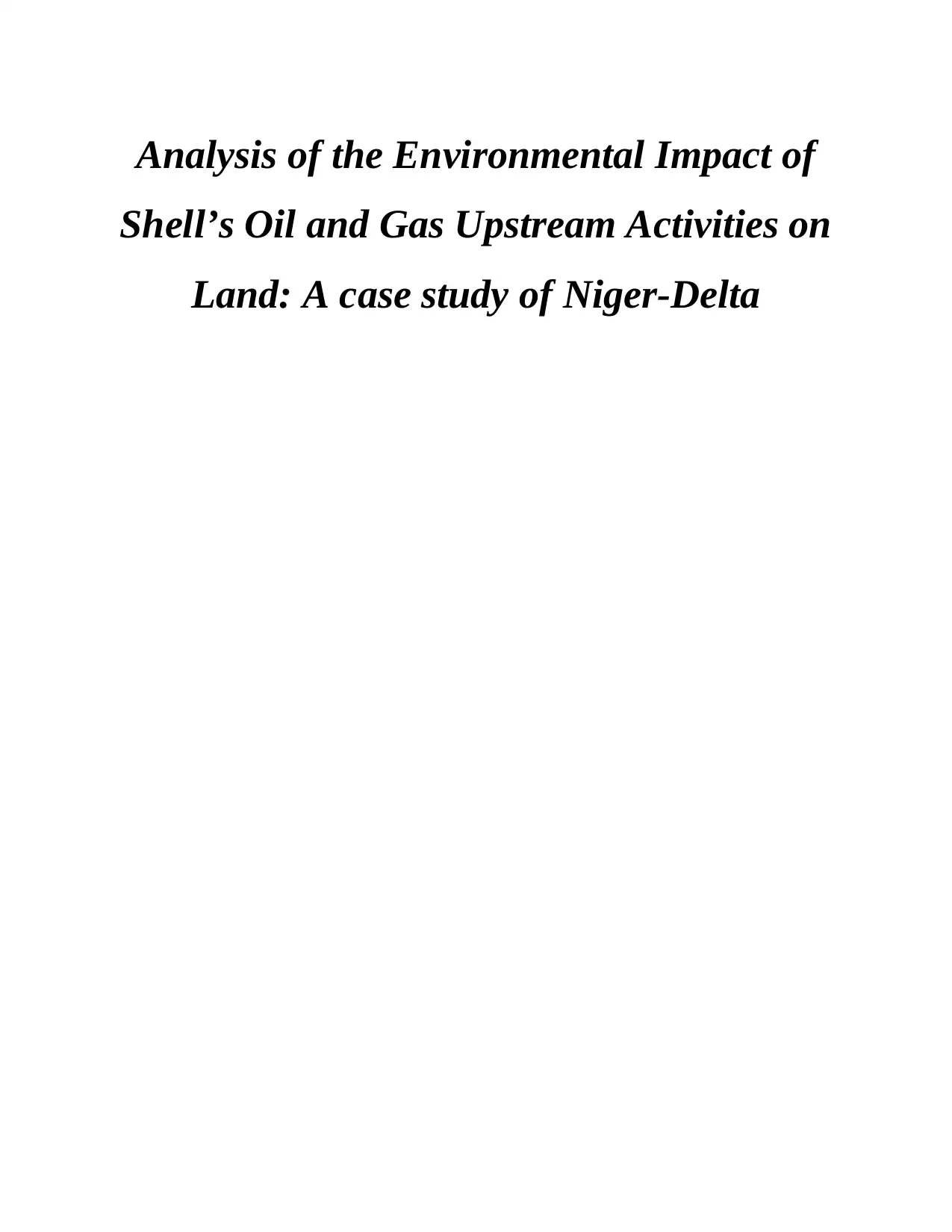
Analysis of the Environmental Impact of
Shell’s Oil and Gas Upstream Activities on
Land: A case study of Niger-Delta
Shell’s Oil and Gas Upstream Activities on
Land: A case study of Niger-Delta
Paraphrase This Document
Need a fresh take? Get an instant paraphrase of this document with our AI Paraphraser
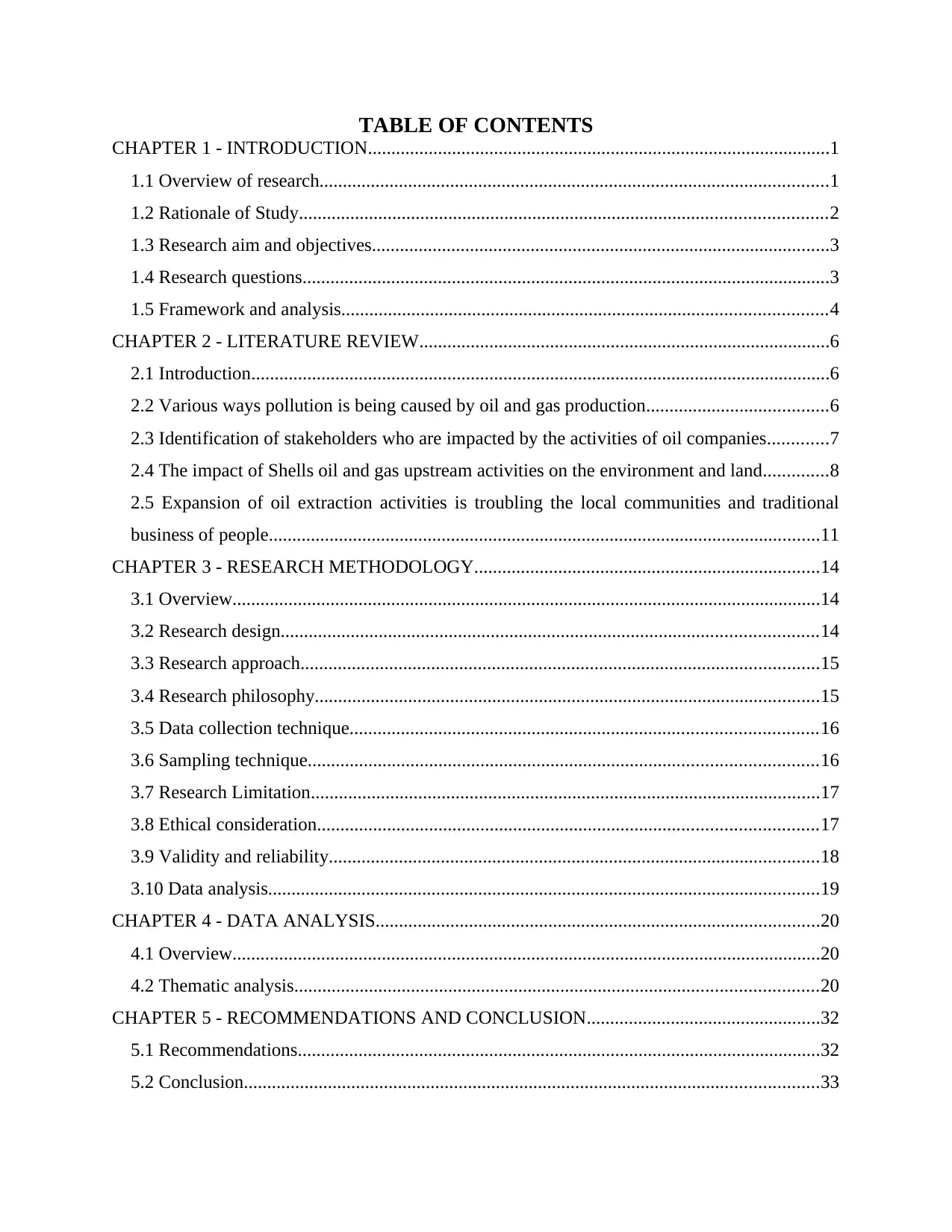
TABLE OF CONTENTS
CHAPTER 1 - INTRODUCTION...................................................................................................1
1.1 Overview of research.............................................................................................................1
1.2 Rationale of Study.................................................................................................................2
1.3 Research aim and objectives..................................................................................................3
1.4 Research questions.................................................................................................................3
1.5 Framework and analysis........................................................................................................4
CHAPTER 2 - LITERATURE REVIEW........................................................................................6
2.1 Introduction............................................................................................................................6
2.2 Various ways pollution is being caused by oil and gas production.......................................6
2.3 Identification of stakeholders who are impacted by the activities of oil companies.............7
2.4 The impact of Shells oil and gas upstream activities on the environment and land..............8
2.5 Expansion of oil extraction activities is troubling the local communities and traditional
business of people......................................................................................................................11
CHAPTER 3 - RESEARCH METHODOLOGY..........................................................................14
3.1 Overview..............................................................................................................................14
3.2 Research design...................................................................................................................14
3.3 Research approach...............................................................................................................15
3.4 Research philosophy............................................................................................................15
3.5 Data collection technique....................................................................................................16
3.6 Sampling technique.............................................................................................................16
3.7 Research Limitation.............................................................................................................17
3.8 Ethical consideration...........................................................................................................17
3.9 Validity and reliability.........................................................................................................18
3.10 Data analysis......................................................................................................................19
CHAPTER 4 - DATA ANALYSIS...............................................................................................20
4.1 Overview..............................................................................................................................20
4.2 Thematic analysis................................................................................................................20
CHAPTER 5 - RECOMMENDATIONS AND CONCLUSION..................................................32
5.1 Recommendations................................................................................................................32
5.2 Conclusion...........................................................................................................................33
CHAPTER 1 - INTRODUCTION...................................................................................................1
1.1 Overview of research.............................................................................................................1
1.2 Rationale of Study.................................................................................................................2
1.3 Research aim and objectives..................................................................................................3
1.4 Research questions.................................................................................................................3
1.5 Framework and analysis........................................................................................................4
CHAPTER 2 - LITERATURE REVIEW........................................................................................6
2.1 Introduction............................................................................................................................6
2.2 Various ways pollution is being caused by oil and gas production.......................................6
2.3 Identification of stakeholders who are impacted by the activities of oil companies.............7
2.4 The impact of Shells oil and gas upstream activities on the environment and land..............8
2.5 Expansion of oil extraction activities is troubling the local communities and traditional
business of people......................................................................................................................11
CHAPTER 3 - RESEARCH METHODOLOGY..........................................................................14
3.1 Overview..............................................................................................................................14
3.2 Research design...................................................................................................................14
3.3 Research approach...............................................................................................................15
3.4 Research philosophy............................................................................................................15
3.5 Data collection technique....................................................................................................16
3.6 Sampling technique.............................................................................................................16
3.7 Research Limitation.............................................................................................................17
3.8 Ethical consideration...........................................................................................................17
3.9 Validity and reliability.........................................................................................................18
3.10 Data analysis......................................................................................................................19
CHAPTER 4 - DATA ANALYSIS...............................................................................................20
4.1 Overview..............................................................................................................................20
4.2 Thematic analysis................................................................................................................20
CHAPTER 5 - RECOMMENDATIONS AND CONCLUSION..................................................32
5.1 Recommendations................................................................................................................32
5.2 Conclusion...........................................................................................................................33

REFERENCES..............................................................................................................................34
APPENDIX....................................................................................................................................37
APPENDIX....................................................................................................................................37
⊘ This is a preview!⊘
Do you want full access?
Subscribe today to unlock all pages.

Trusted by 1+ million students worldwide
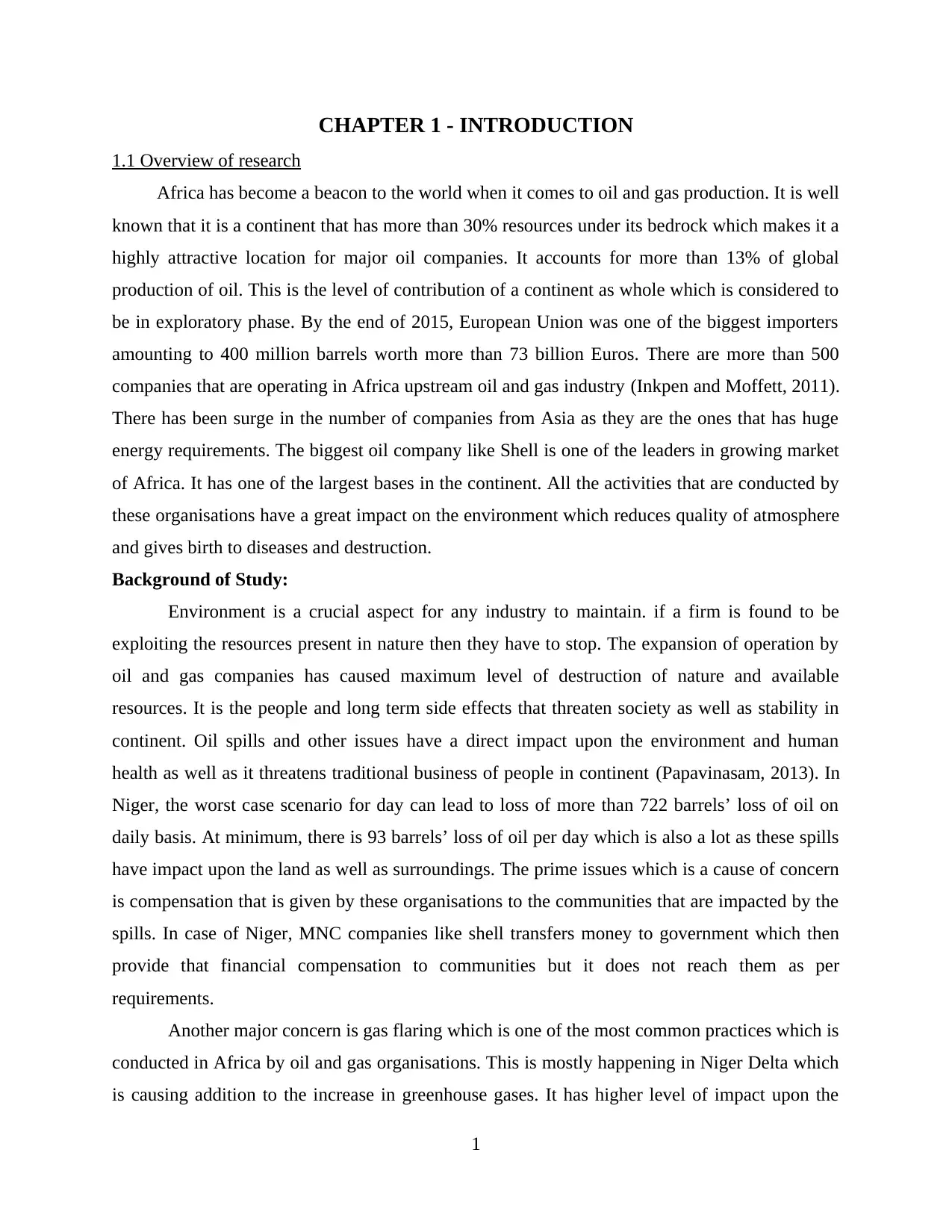
CHAPTER 1 - INTRODUCTION
1.1 Overview of research
Africa has become a beacon to the world when it comes to oil and gas production. It is well
known that it is a continent that has more than 30% resources under its bedrock which makes it a
highly attractive location for major oil companies. It accounts for more than 13% of global
production of oil. This is the level of contribution of a continent as whole which is considered to
be in exploratory phase. By the end of 2015, European Union was one of the biggest importers
amounting to 400 million barrels worth more than 73 billion Euros. There are more than 500
companies that are operating in Africa upstream oil and gas industry (Inkpen and Moffett, 2011).
There has been surge in the number of companies from Asia as they are the ones that has huge
energy requirements. The biggest oil company like Shell is one of the leaders in growing market
of Africa. It has one of the largest bases in the continent. All the activities that are conducted by
these organisations have a great impact on the environment which reduces quality of atmosphere
and gives birth to diseases and destruction.
Background of Study:
Environment is a crucial aspect for any industry to maintain. if a firm is found to be
exploiting the resources present in nature then they have to stop. The expansion of operation by
oil and gas companies has caused maximum level of destruction of nature and available
resources. It is the people and long term side effects that threaten society as well as stability in
continent. Oil spills and other issues have a direct impact upon the environment and human
health as well as it threatens traditional business of people in continent (Papavinasam, 2013). In
Niger, the worst case scenario for day can lead to loss of more than 722 barrels’ loss of oil on
daily basis. At minimum, there is 93 barrels’ loss of oil per day which is also a lot as these spills
have impact upon the land as well as surroundings. The prime issues which is a cause of concern
is compensation that is given by these organisations to the communities that are impacted by the
spills. In case of Niger, MNC companies like shell transfers money to government which then
provide that financial compensation to communities but it does not reach them as per
requirements.
Another major concern is gas flaring which is one of the most common practices which is
conducted in Africa by oil and gas organisations. This is mostly happening in Niger Delta which
is causing addition to the increase in greenhouse gases. It has higher level of impact upon the
1
1.1 Overview of research
Africa has become a beacon to the world when it comes to oil and gas production. It is well
known that it is a continent that has more than 30% resources under its bedrock which makes it a
highly attractive location for major oil companies. It accounts for more than 13% of global
production of oil. This is the level of contribution of a continent as whole which is considered to
be in exploratory phase. By the end of 2015, European Union was one of the biggest importers
amounting to 400 million barrels worth more than 73 billion Euros. There are more than 500
companies that are operating in Africa upstream oil and gas industry (Inkpen and Moffett, 2011).
There has been surge in the number of companies from Asia as they are the ones that has huge
energy requirements. The biggest oil company like Shell is one of the leaders in growing market
of Africa. It has one of the largest bases in the continent. All the activities that are conducted by
these organisations have a great impact on the environment which reduces quality of atmosphere
and gives birth to diseases and destruction.
Background of Study:
Environment is a crucial aspect for any industry to maintain. if a firm is found to be
exploiting the resources present in nature then they have to stop. The expansion of operation by
oil and gas companies has caused maximum level of destruction of nature and available
resources. It is the people and long term side effects that threaten society as well as stability in
continent. Oil spills and other issues have a direct impact upon the environment and human
health as well as it threatens traditional business of people in continent (Papavinasam, 2013). In
Niger, the worst case scenario for day can lead to loss of more than 722 barrels’ loss of oil on
daily basis. At minimum, there is 93 barrels’ loss of oil per day which is also a lot as these spills
have impact upon the land as well as surroundings. The prime issues which is a cause of concern
is compensation that is given by these organisations to the communities that are impacted by the
spills. In case of Niger, MNC companies like shell transfers money to government which then
provide that financial compensation to communities but it does not reach them as per
requirements.
Another major concern is gas flaring which is one of the most common practices which is
conducted in Africa by oil and gas organisations. This is mostly happening in Niger Delta which
is causing addition to the increase in greenhouse gases. It has higher level of impact upon the
1
Paraphrase This Document
Need a fresh take? Get an instant paraphrase of this document with our AI Paraphraser
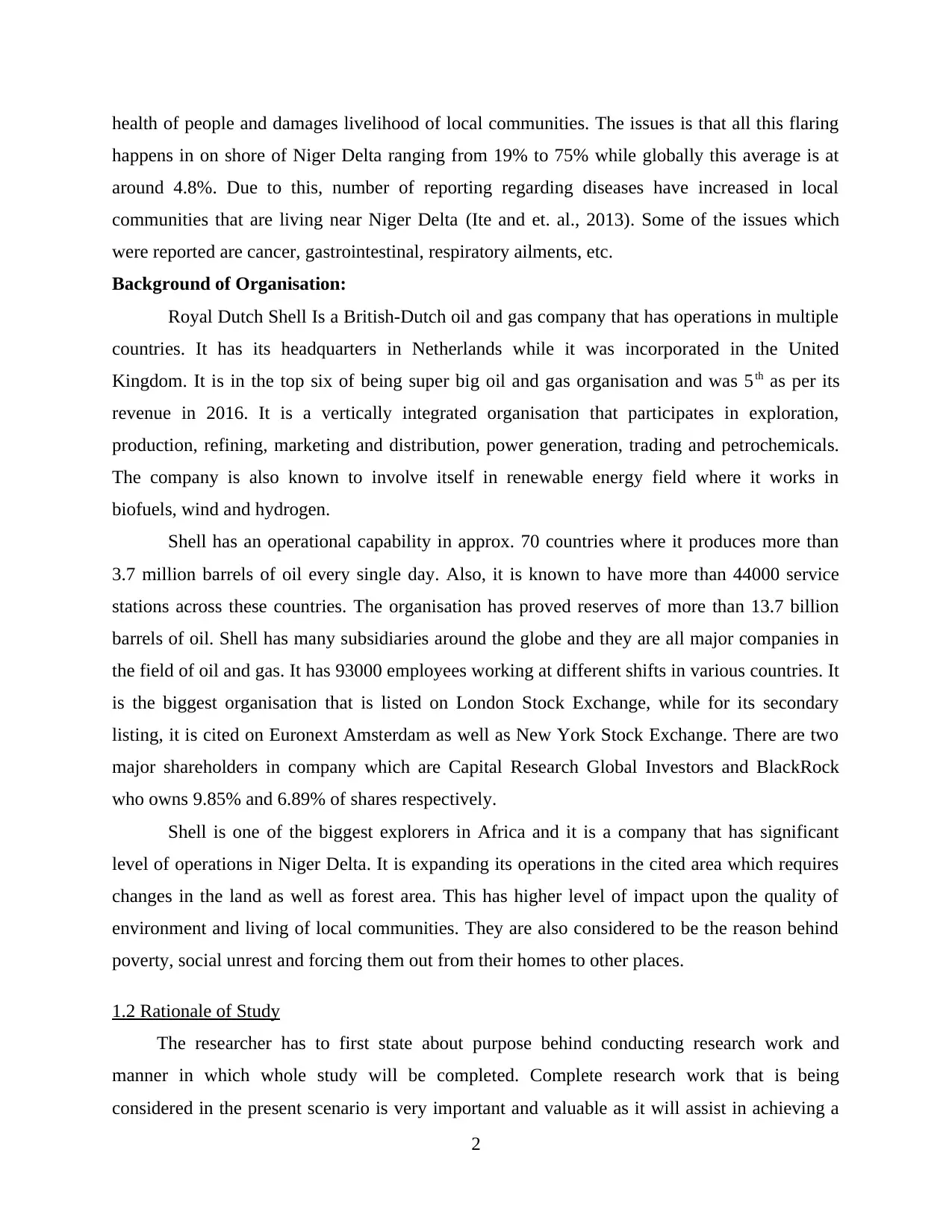
health of people and damages livelihood of local communities. The issues is that all this flaring
happens in on shore of Niger Delta ranging from 19% to 75% while globally this average is at
around 4.8%. Due to this, number of reporting regarding diseases have increased in local
communities that are living near Niger Delta (Ite and et. al., 2013). Some of the issues which
were reported are cancer, gastrointestinal, respiratory ailments, etc.
Background of Organisation:
Royal Dutch Shell Is a British-Dutch oil and gas company that has operations in multiple
countries. It has its headquarters in Netherlands while it was incorporated in the United
Kingdom. It is in the top six of being super big oil and gas organisation and was 5th as per its
revenue in 2016. It is a vertically integrated organisation that participates in exploration,
production, refining, marketing and distribution, power generation, trading and petrochemicals.
The company is also known to involve itself in renewable energy field where it works in
biofuels, wind and hydrogen.
Shell has an operational capability in approx. 70 countries where it produces more than
3.7 million barrels of oil every single day. Also, it is known to have more than 44000 service
stations across these countries. The organisation has proved reserves of more than 13.7 billion
barrels of oil. Shell has many subsidiaries around the globe and they are all major companies in
the field of oil and gas. It has 93000 employees working at different shifts in various countries. It
is the biggest organisation that is listed on London Stock Exchange, while for its secondary
listing, it is cited on Euronext Amsterdam as well as New York Stock Exchange. There are two
major shareholders in company which are Capital Research Global Investors and BlackRock
who owns 9.85% and 6.89% of shares respectively.
Shell is one of the biggest explorers in Africa and it is a company that has significant
level of operations in Niger Delta. It is expanding its operations in the cited area which requires
changes in the land as well as forest area. This has higher level of impact upon the quality of
environment and living of local communities. They are also considered to be the reason behind
poverty, social unrest and forcing them out from their homes to other places.
1.2 Rationale of Study
The researcher has to first state about purpose behind conducting research work and
manner in which whole study will be completed. Complete research work that is being
considered in the present scenario is very important and valuable as it will assist in achieving a
2
happens in on shore of Niger Delta ranging from 19% to 75% while globally this average is at
around 4.8%. Due to this, number of reporting regarding diseases have increased in local
communities that are living near Niger Delta (Ite and et. al., 2013). Some of the issues which
were reported are cancer, gastrointestinal, respiratory ailments, etc.
Background of Organisation:
Royal Dutch Shell Is a British-Dutch oil and gas company that has operations in multiple
countries. It has its headquarters in Netherlands while it was incorporated in the United
Kingdom. It is in the top six of being super big oil and gas organisation and was 5th as per its
revenue in 2016. It is a vertically integrated organisation that participates in exploration,
production, refining, marketing and distribution, power generation, trading and petrochemicals.
The company is also known to involve itself in renewable energy field where it works in
biofuels, wind and hydrogen.
Shell has an operational capability in approx. 70 countries where it produces more than
3.7 million barrels of oil every single day. Also, it is known to have more than 44000 service
stations across these countries. The organisation has proved reserves of more than 13.7 billion
barrels of oil. Shell has many subsidiaries around the globe and they are all major companies in
the field of oil and gas. It has 93000 employees working at different shifts in various countries. It
is the biggest organisation that is listed on London Stock Exchange, while for its secondary
listing, it is cited on Euronext Amsterdam as well as New York Stock Exchange. There are two
major shareholders in company which are Capital Research Global Investors and BlackRock
who owns 9.85% and 6.89% of shares respectively.
Shell is one of the biggest explorers in Africa and it is a company that has significant
level of operations in Niger Delta. It is expanding its operations in the cited area which requires
changes in the land as well as forest area. This has higher level of impact upon the quality of
environment and living of local communities. They are also considered to be the reason behind
poverty, social unrest and forcing them out from their homes to other places.
1.2 Rationale of Study
The researcher has to first state about purpose behind conducting research work and
manner in which whole study will be completed. Complete research work that is being
considered in the present scenario is very important and valuable as it will assist in achieving a
2
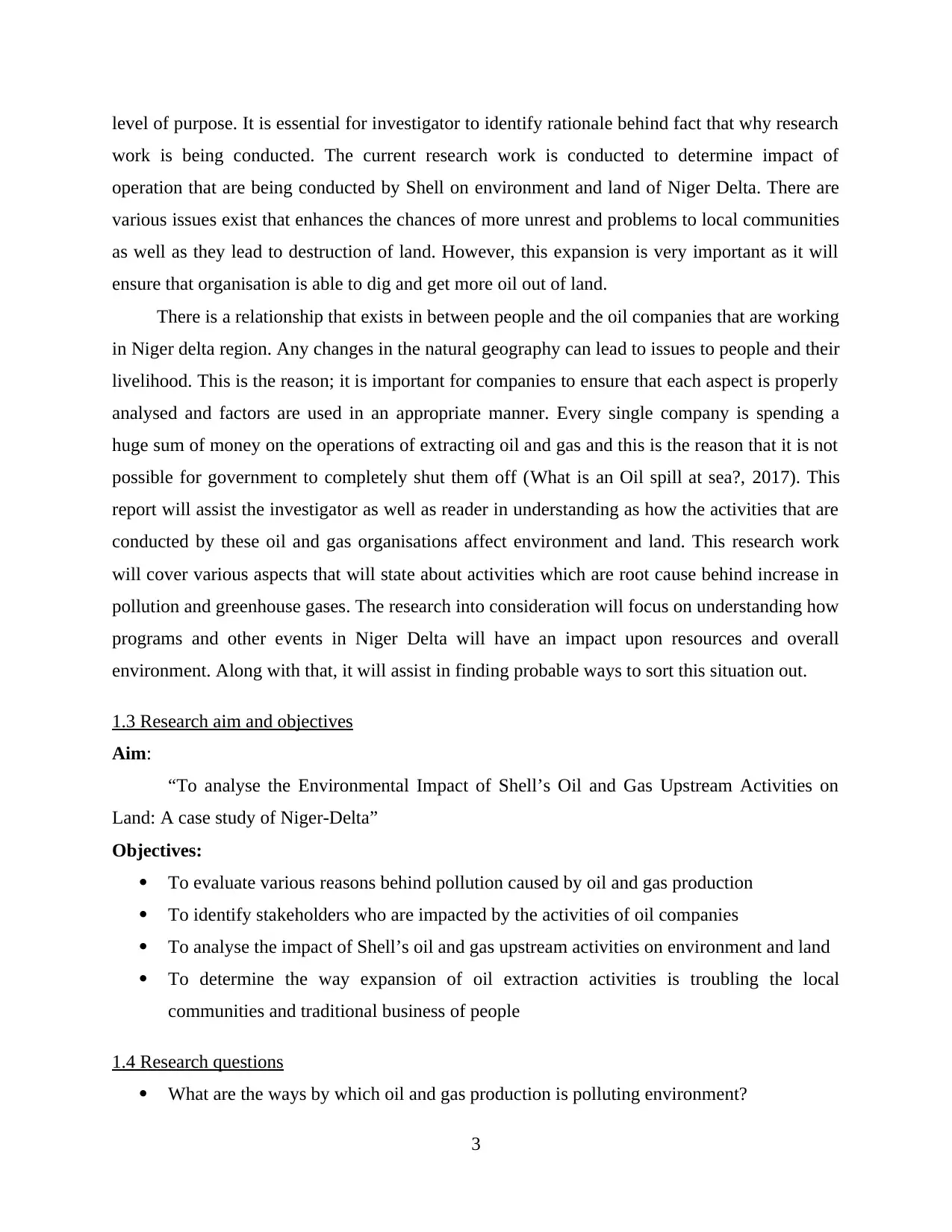
level of purpose. It is essential for investigator to identify rationale behind fact that why research
work is being conducted. The current research work is conducted to determine impact of
operation that are being conducted by Shell on environment and land of Niger Delta. There are
various issues exist that enhances the chances of more unrest and problems to local communities
as well as they lead to destruction of land. However, this expansion is very important as it will
ensure that organisation is able to dig and get more oil out of land.
There is a relationship that exists in between people and the oil companies that are working
in Niger delta region. Any changes in the natural geography can lead to issues to people and their
livelihood. This is the reason; it is important for companies to ensure that each aspect is properly
analysed and factors are used in an appropriate manner. Every single company is spending a
huge sum of money on the operations of extracting oil and gas and this is the reason that it is not
possible for government to completely shut them off (What is an Oil spill at sea?, 2017). This
report will assist the investigator as well as reader in understanding as how the activities that are
conducted by these oil and gas organisations affect environment and land. This research work
will cover various aspects that will state about activities which are root cause behind increase in
pollution and greenhouse gases. The research into consideration will focus on understanding how
programs and other events in Niger Delta will have an impact upon resources and overall
environment. Along with that, it will assist in finding probable ways to sort this situation out.
1.3 Research aim and objectives
Aim:
“To analyse the Environmental Impact of Shell’s Oil and Gas Upstream Activities on
Land: A case study of Niger-Delta”
Objectives:
To evaluate various reasons behind pollution caused by oil and gas production
To identify stakeholders who are impacted by the activities of oil companies
To analyse the impact of Shell’s oil and gas upstream activities on environment and land
To determine the way expansion of oil extraction activities is troubling the local
communities and traditional business of people
1.4 Research questions
What are the ways by which oil and gas production is polluting environment?
3
work is being conducted. The current research work is conducted to determine impact of
operation that are being conducted by Shell on environment and land of Niger Delta. There are
various issues exist that enhances the chances of more unrest and problems to local communities
as well as they lead to destruction of land. However, this expansion is very important as it will
ensure that organisation is able to dig and get more oil out of land.
There is a relationship that exists in between people and the oil companies that are working
in Niger delta region. Any changes in the natural geography can lead to issues to people and their
livelihood. This is the reason; it is important for companies to ensure that each aspect is properly
analysed and factors are used in an appropriate manner. Every single company is spending a
huge sum of money on the operations of extracting oil and gas and this is the reason that it is not
possible for government to completely shut them off (What is an Oil spill at sea?, 2017). This
report will assist the investigator as well as reader in understanding as how the activities that are
conducted by these oil and gas organisations affect environment and land. This research work
will cover various aspects that will state about activities which are root cause behind increase in
pollution and greenhouse gases. The research into consideration will focus on understanding how
programs and other events in Niger Delta will have an impact upon resources and overall
environment. Along with that, it will assist in finding probable ways to sort this situation out.
1.3 Research aim and objectives
Aim:
“To analyse the Environmental Impact of Shell’s Oil and Gas Upstream Activities on
Land: A case study of Niger-Delta”
Objectives:
To evaluate various reasons behind pollution caused by oil and gas production
To identify stakeholders who are impacted by the activities of oil companies
To analyse the impact of Shell’s oil and gas upstream activities on environment and land
To determine the way expansion of oil extraction activities is troubling the local
communities and traditional business of people
1.4 Research questions
What are the ways by which oil and gas production is polluting environment?
3
⊘ This is a preview!⊘
Do you want full access?
Subscribe today to unlock all pages.

Trusted by 1+ million students worldwide
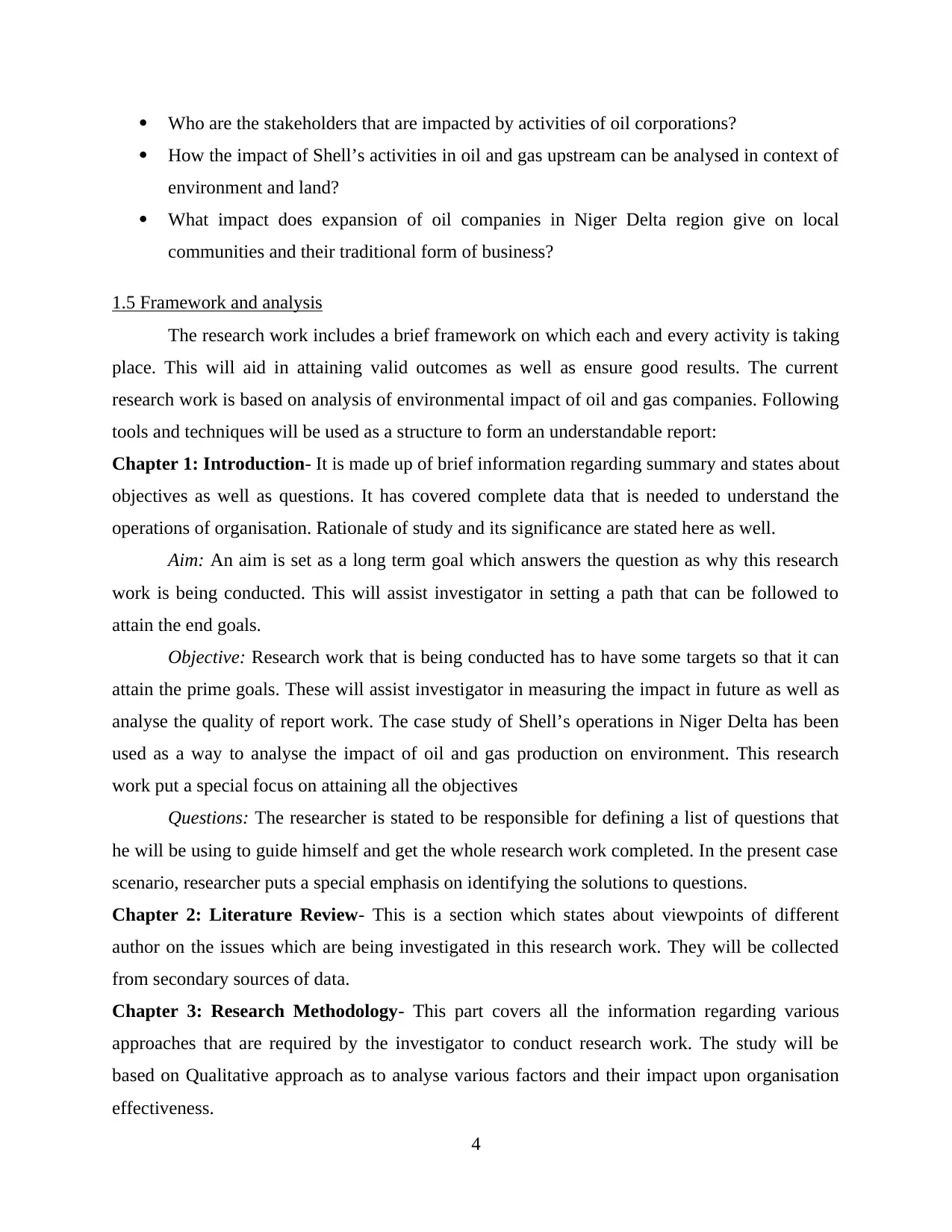
Who are the stakeholders that are impacted by activities of oil corporations?
How the impact of Shell’s activities in oil and gas upstream can be analysed in context of
environment and land?
What impact does expansion of oil companies in Niger Delta region give on local
communities and their traditional form of business?
1.5 Framework and analysis
The research work includes a brief framework on which each and every activity is taking
place. This will aid in attaining valid outcomes as well as ensure good results. The current
research work is based on analysis of environmental impact of oil and gas companies. Following
tools and techniques will be used as a structure to form an understandable report:
Chapter 1: Introduction- It is made up of brief information regarding summary and states about
objectives as well as questions. It has covered complete data that is needed to understand the
operations of organisation. Rationale of study and its significance are stated here as well.
Aim: An aim is set as a long term goal which answers the question as why this research
work is being conducted. This will assist investigator in setting a path that can be followed to
attain the end goals.
Objective: Research work that is being conducted has to have some targets so that it can
attain the prime goals. These will assist investigator in measuring the impact in future as well as
analyse the quality of report work. The case study of Shell’s operations in Niger Delta has been
used as a way to analyse the impact of oil and gas production on environment. This research
work put a special focus on attaining all the objectives
Questions: The researcher is stated to be responsible for defining a list of questions that
he will be using to guide himself and get the whole research work completed. In the present case
scenario, researcher puts a special emphasis on identifying the solutions to questions.
Chapter 2: Literature Review- This is a section which states about viewpoints of different
author on the issues which are being investigated in this research work. They will be collected
from secondary sources of data.
Chapter 3: Research Methodology- This part covers all the information regarding various
approaches that are required by the investigator to conduct research work. The study will be
based on Qualitative approach as to analyse various factors and their impact upon organisation
effectiveness.
4
How the impact of Shell’s activities in oil and gas upstream can be analysed in context of
environment and land?
What impact does expansion of oil companies in Niger Delta region give on local
communities and their traditional form of business?
1.5 Framework and analysis
The research work includes a brief framework on which each and every activity is taking
place. This will aid in attaining valid outcomes as well as ensure good results. The current
research work is based on analysis of environmental impact of oil and gas companies. Following
tools and techniques will be used as a structure to form an understandable report:
Chapter 1: Introduction- It is made up of brief information regarding summary and states about
objectives as well as questions. It has covered complete data that is needed to understand the
operations of organisation. Rationale of study and its significance are stated here as well.
Aim: An aim is set as a long term goal which answers the question as why this research
work is being conducted. This will assist investigator in setting a path that can be followed to
attain the end goals.
Objective: Research work that is being conducted has to have some targets so that it can
attain the prime goals. These will assist investigator in measuring the impact in future as well as
analyse the quality of report work. The case study of Shell’s operations in Niger Delta has been
used as a way to analyse the impact of oil and gas production on environment. This research
work put a special focus on attaining all the objectives
Questions: The researcher is stated to be responsible for defining a list of questions that
he will be using to guide himself and get the whole research work completed. In the present case
scenario, researcher puts a special emphasis on identifying the solutions to questions.
Chapter 2: Literature Review- This is a section which states about viewpoints of different
author on the issues which are being investigated in this research work. They will be collected
from secondary sources of data.
Chapter 3: Research Methodology- This part covers all the information regarding various
approaches that are required by the investigator to conduct research work. The study will be
based on Qualitative approach as to analyse various factors and their impact upon organisation
effectiveness.
4
Paraphrase This Document
Need a fresh take? Get an instant paraphrase of this document with our AI Paraphraser
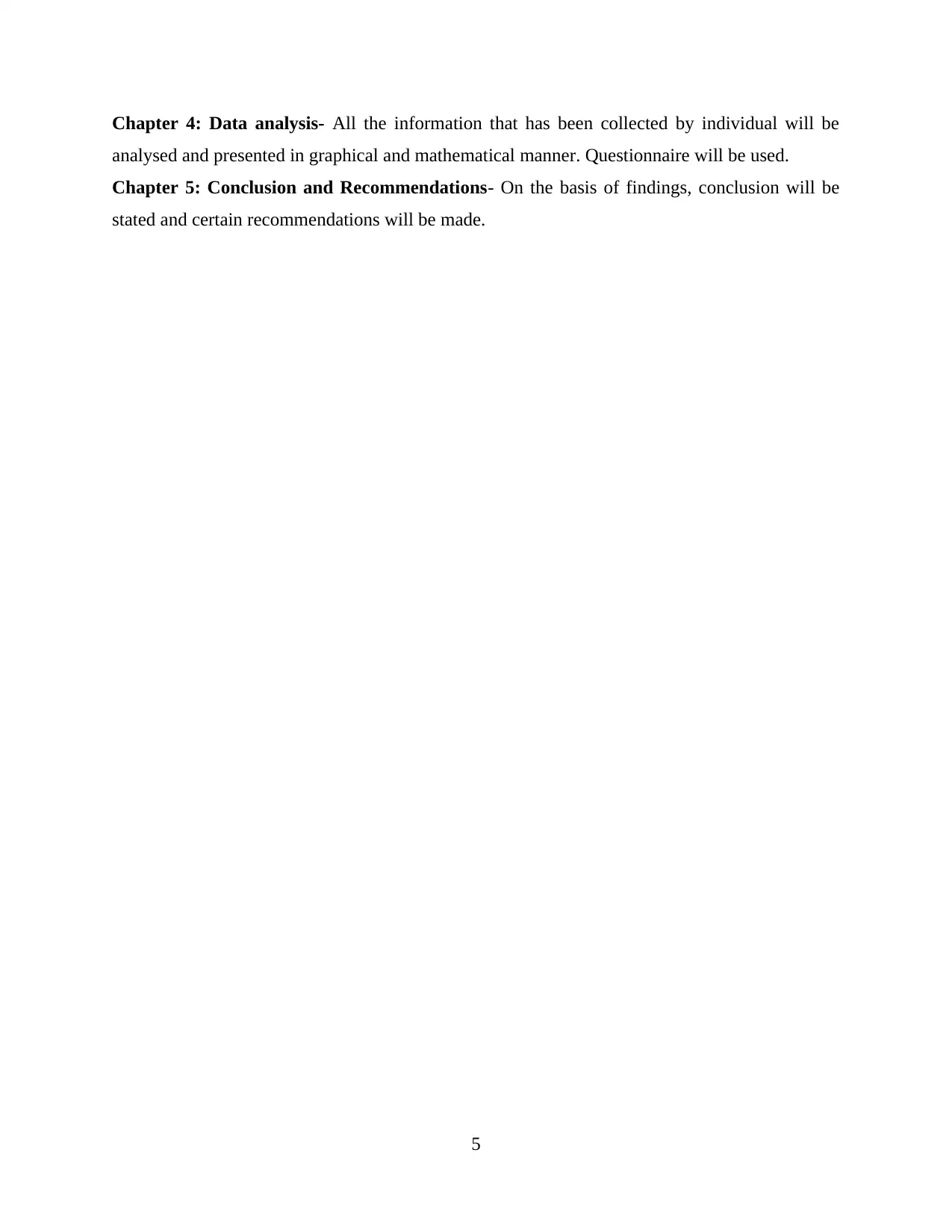
Chapter 4: Data analysis- All the information that has been collected by individual will be
analysed and presented in graphical and mathematical manner. Questionnaire will be used.
Chapter 5: Conclusion and Recommendations- On the basis of findings, conclusion will be
stated and certain recommendations will be made.
5
analysed and presented in graphical and mathematical manner. Questionnaire will be used.
Chapter 5: Conclusion and Recommendations- On the basis of findings, conclusion will be
stated and certain recommendations will be made.
5
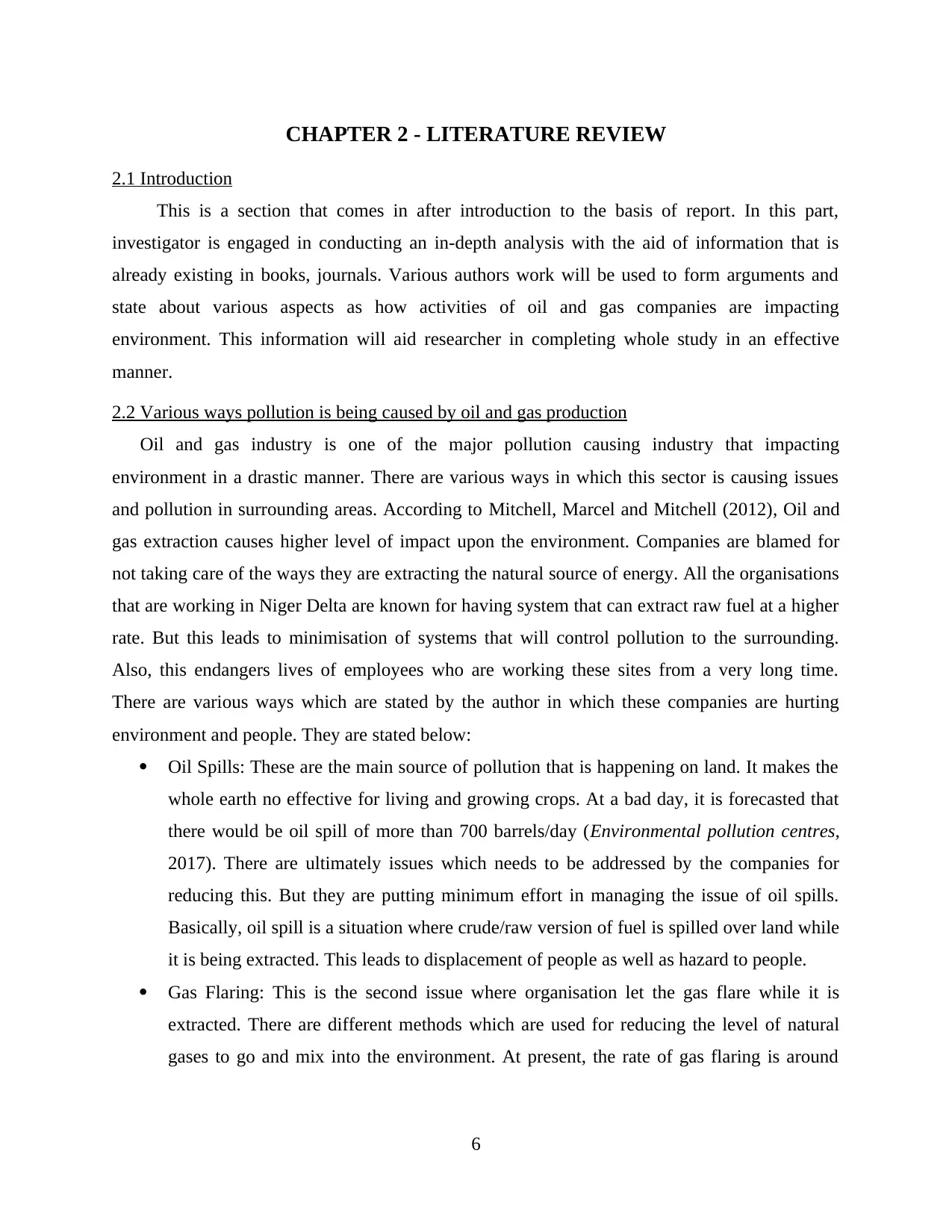
CHAPTER 2 - LITERATURE REVIEW
2.1 Introduction
This is a section that comes in after introduction to the basis of report. In this part,
investigator is engaged in conducting an in-depth analysis with the aid of information that is
already existing in books, journals. Various authors work will be used to form arguments and
state about various aspects as how activities of oil and gas companies are impacting
environment. This information will aid researcher in completing whole study in an effective
manner.
2.2 Various ways pollution is being caused by oil and gas production
Oil and gas industry is one of the major pollution causing industry that impacting
environment in a drastic manner. There are various ways in which this sector is causing issues
and pollution in surrounding areas. According to Mitchell, Marcel and Mitchell (2012), Oil and
gas extraction causes higher level of impact upon the environment. Companies are blamed for
not taking care of the ways they are extracting the natural source of energy. All the organisations
that are working in Niger Delta are known for having system that can extract raw fuel at a higher
rate. But this leads to minimisation of systems that will control pollution to the surrounding.
Also, this endangers lives of employees who are working these sites from a very long time.
There are various ways which are stated by the author in which these companies are hurting
environment and people. They are stated below:
Oil Spills: These are the main source of pollution that is happening on land. It makes the
whole earth no effective for living and growing crops. At a bad day, it is forecasted that
there would be oil spill of more than 700 barrels/day (Environmental pollution centres,
2017). There are ultimately issues which needs to be addressed by the companies for
reducing this. But they are putting minimum effort in managing the issue of oil spills.
Basically, oil spill is a situation where crude/raw version of fuel is spilled over land while
it is being extracted. This leads to displacement of people as well as hazard to people.
Gas Flaring: This is the second issue where organisation let the gas flare while it is
extracted. There are different methods which are used for reducing the level of natural
gases to go and mix into the environment. At present, the rate of gas flaring is around
6
2.1 Introduction
This is a section that comes in after introduction to the basis of report. In this part,
investigator is engaged in conducting an in-depth analysis with the aid of information that is
already existing in books, journals. Various authors work will be used to form arguments and
state about various aspects as how activities of oil and gas companies are impacting
environment. This information will aid researcher in completing whole study in an effective
manner.
2.2 Various ways pollution is being caused by oil and gas production
Oil and gas industry is one of the major pollution causing industry that impacting
environment in a drastic manner. There are various ways in which this sector is causing issues
and pollution in surrounding areas. According to Mitchell, Marcel and Mitchell (2012), Oil and
gas extraction causes higher level of impact upon the environment. Companies are blamed for
not taking care of the ways they are extracting the natural source of energy. All the organisations
that are working in Niger Delta are known for having system that can extract raw fuel at a higher
rate. But this leads to minimisation of systems that will control pollution to the surrounding.
Also, this endangers lives of employees who are working these sites from a very long time.
There are various ways which are stated by the author in which these companies are hurting
environment and people. They are stated below:
Oil Spills: These are the main source of pollution that is happening on land. It makes the
whole earth no effective for living and growing crops. At a bad day, it is forecasted that
there would be oil spill of more than 700 barrels/day (Environmental pollution centres,
2017). There are ultimately issues which needs to be addressed by the companies for
reducing this. But they are putting minimum effort in managing the issue of oil spills.
Basically, oil spill is a situation where crude/raw version of fuel is spilled over land while
it is being extracted. This leads to displacement of people as well as hazard to people.
Gas Flaring: This is the second issue where organisation let the gas flare while it is
extracted. There are different methods which are used for reducing the level of natural
gases to go and mix into the environment. At present, the rate of gas flaring is around
6
⊘ This is a preview!⊘
Do you want full access?
Subscribe today to unlock all pages.

Trusted by 1+ million students worldwide
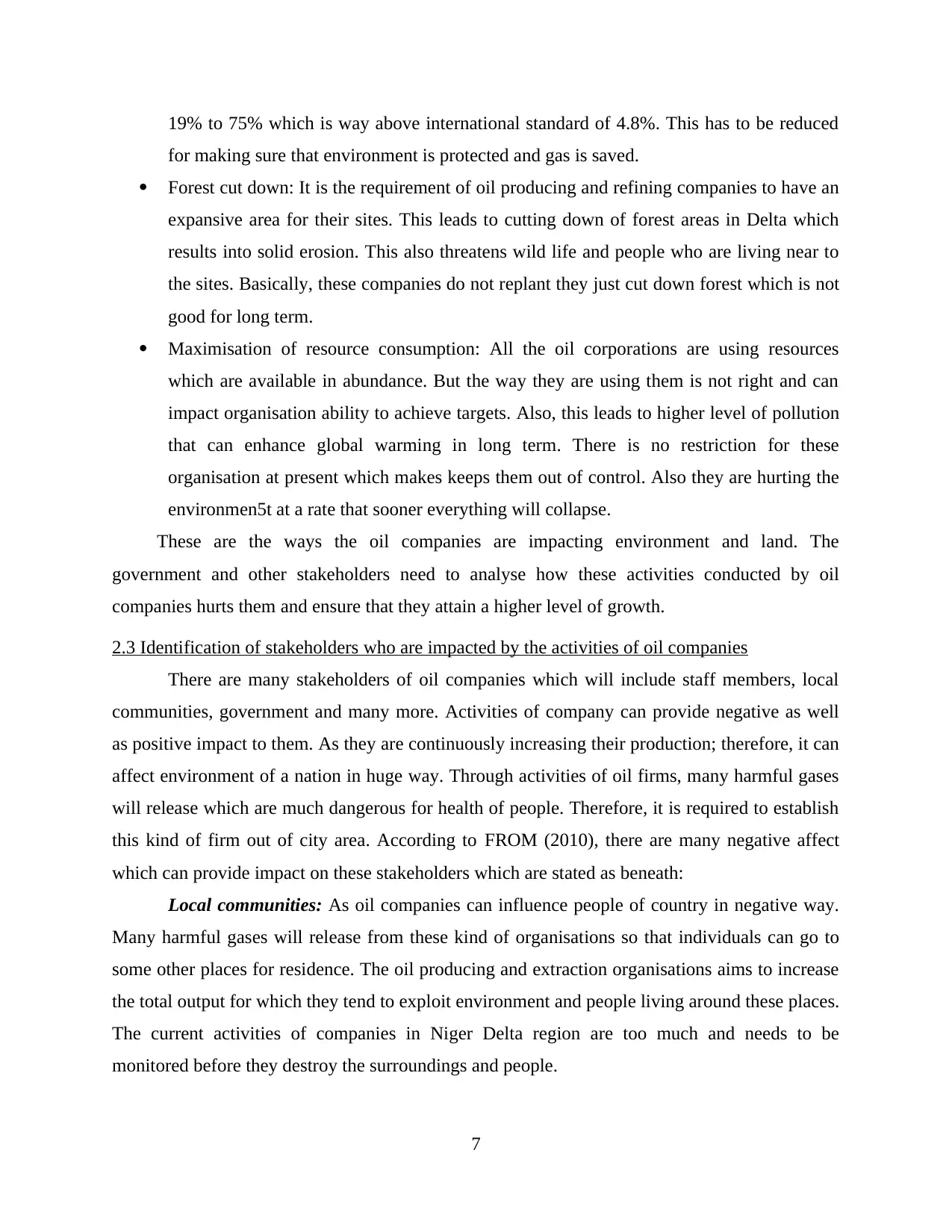
19% to 75% which is way above international standard of 4.8%. This has to be reduced
for making sure that environment is protected and gas is saved.
Forest cut down: It is the requirement of oil producing and refining companies to have an
expansive area for their sites. This leads to cutting down of forest areas in Delta which
results into solid erosion. This also threatens wild life and people who are living near to
the sites. Basically, these companies do not replant they just cut down forest which is not
good for long term.
Maximisation of resource consumption: All the oil corporations are using resources
which are available in abundance. But the way they are using them is not right and can
impact organisation ability to achieve targets. Also, this leads to higher level of pollution
that can enhance global warming in long term. There is no restriction for these
organisation at present which makes keeps them out of control. Also they are hurting the
environmen5t at a rate that sooner everything will collapse.
These are the ways the oil companies are impacting environment and land. The
government and other stakeholders need to analyse how these activities conducted by oil
companies hurts them and ensure that they attain a higher level of growth.
2.3 Identification of stakeholders who are impacted by the activities of oil companies
There are many stakeholders of oil companies which will include staff members, local
communities, government and many more. Activities of company can provide negative as well
as positive impact to them. As they are continuously increasing their production; therefore, it can
affect environment of a nation in huge way. Through activities of oil firms, many harmful gases
will release which are much dangerous for health of people. Therefore, it is required to establish
this kind of firm out of city area. According to FROM (2010), there are many negative affect
which can provide impact on these stakeholders which are stated as beneath:
Local communities: As oil companies can influence people of country in negative way.
Many harmful gases will release from these kind of organisations so that individuals can go to
some other places for residence. The oil producing and extraction organisations aims to increase
the total output for which they tend to exploit environment and people living around these places.
The current activities of companies in Niger Delta region are too much and needs to be
monitored before they destroy the surroundings and people.
7
for making sure that environment is protected and gas is saved.
Forest cut down: It is the requirement of oil producing and refining companies to have an
expansive area for their sites. This leads to cutting down of forest areas in Delta which
results into solid erosion. This also threatens wild life and people who are living near to
the sites. Basically, these companies do not replant they just cut down forest which is not
good for long term.
Maximisation of resource consumption: All the oil corporations are using resources
which are available in abundance. But the way they are using them is not right and can
impact organisation ability to achieve targets. Also, this leads to higher level of pollution
that can enhance global warming in long term. There is no restriction for these
organisation at present which makes keeps them out of control. Also they are hurting the
environmen5t at a rate that sooner everything will collapse.
These are the ways the oil companies are impacting environment and land. The
government and other stakeholders need to analyse how these activities conducted by oil
companies hurts them and ensure that they attain a higher level of growth.
2.3 Identification of stakeholders who are impacted by the activities of oil companies
There are many stakeholders of oil companies which will include staff members, local
communities, government and many more. Activities of company can provide negative as well
as positive impact to them. As they are continuously increasing their production; therefore, it can
affect environment of a nation in huge way. Through activities of oil firms, many harmful gases
will release which are much dangerous for health of people. Therefore, it is required to establish
this kind of firm out of city area. According to FROM (2010), there are many negative affect
which can provide impact on these stakeholders which are stated as beneath:
Local communities: As oil companies can influence people of country in negative way.
Many harmful gases will release from these kind of organisations so that individuals can go to
some other places for residence. The oil producing and extraction organisations aims to increase
the total output for which they tend to exploit environment and people living around these places.
The current activities of companies in Niger Delta region are too much and needs to be
monitored before they destroy the surroundings and people.
7
Paraphrase This Document
Need a fresh take? Get an instant paraphrase of this document with our AI Paraphraser
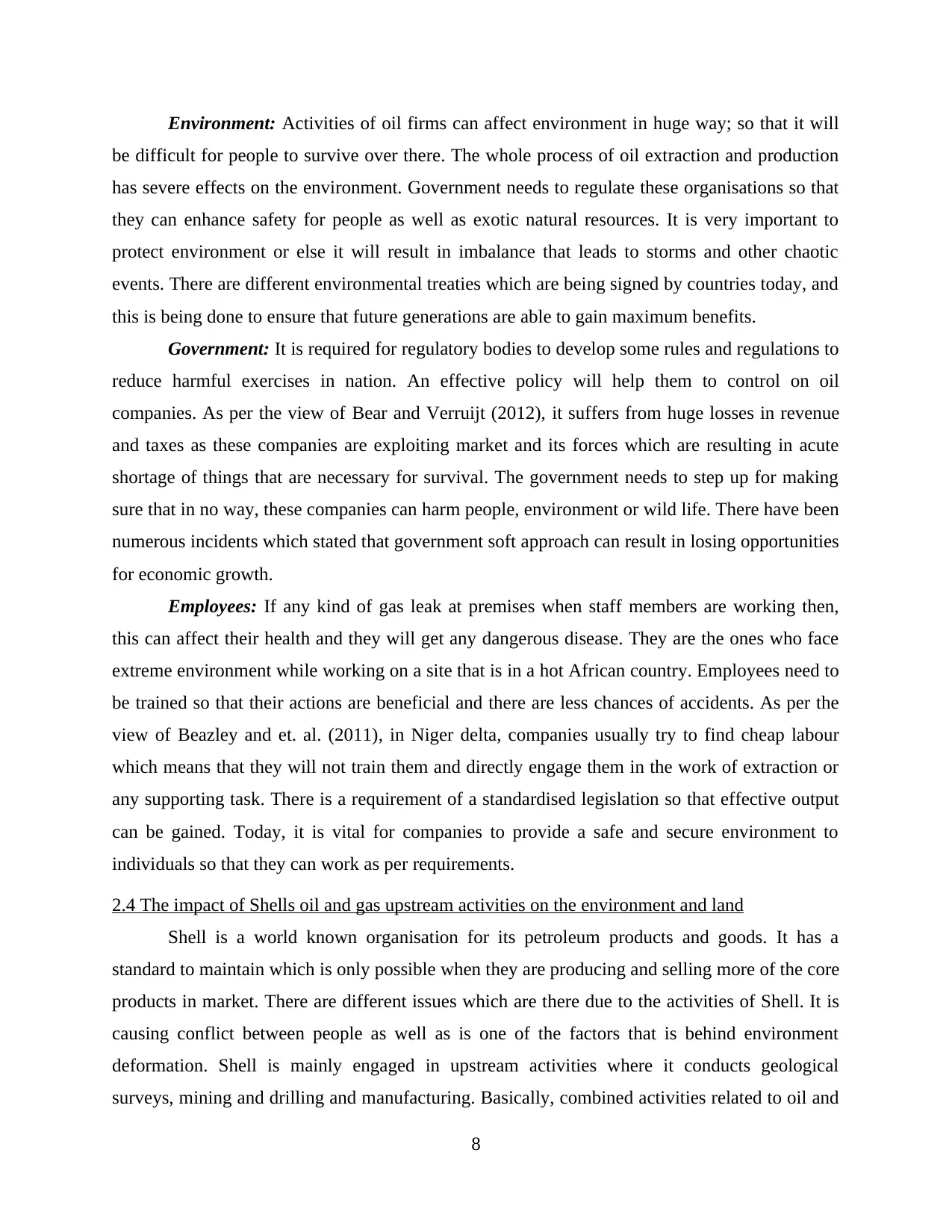
Environment: Activities of oil firms can affect environment in huge way; so that it will
be difficult for people to survive over there. The whole process of oil extraction and production
has severe effects on the environment. Government needs to regulate these organisations so that
they can enhance safety for people as well as exotic natural resources. It is very important to
protect environment or else it will result in imbalance that leads to storms and other chaotic
events. There are different environmental treaties which are being signed by countries today, and
this is being done to ensure that future generations are able to gain maximum benefits.
Government: It is required for regulatory bodies to develop some rules and regulations to
reduce harmful exercises in nation. An effective policy will help them to control on oil
companies. As per the view of Bear and Verruijt (2012), it suffers from huge losses in revenue
and taxes as these companies are exploiting market and its forces which are resulting in acute
shortage of things that are necessary for survival. The government needs to step up for making
sure that in no way, these companies can harm people, environment or wild life. There have been
numerous incidents which stated that government soft approach can result in losing opportunities
for economic growth.
Employees: If any kind of gas leak at premises when staff members are working then,
this can affect their health and they will get any dangerous disease. They are the ones who face
extreme environment while working on a site that is in a hot African country. Employees need to
be trained so that their actions are beneficial and there are less chances of accidents. As per the
view of Beazley and et. al. (2011), in Niger delta, companies usually try to find cheap labour
which means that they will not train them and directly engage them in the work of extraction or
any supporting task. There is a requirement of a standardised legislation so that effective output
can be gained. Today, it is vital for companies to provide a safe and secure environment to
individuals so that they can work as per requirements.
2.4 The impact of Shells oil and gas upstream activities on the environment and land
Shell is a world known organisation for its petroleum products and goods. It has a
standard to maintain which is only possible when they are producing and selling more of the core
products in market. There are different issues which are there due to the activities of Shell. It is
causing conflict between people as well as is one of the factors that is behind environment
deformation. Shell is mainly engaged in upstream activities where it conducts geological
surveys, mining and drilling and manufacturing. Basically, combined activities related to oil and
8
be difficult for people to survive over there. The whole process of oil extraction and production
has severe effects on the environment. Government needs to regulate these organisations so that
they can enhance safety for people as well as exotic natural resources. It is very important to
protect environment or else it will result in imbalance that leads to storms and other chaotic
events. There are different environmental treaties which are being signed by countries today, and
this is being done to ensure that future generations are able to gain maximum benefits.
Government: It is required for regulatory bodies to develop some rules and regulations to
reduce harmful exercises in nation. An effective policy will help them to control on oil
companies. As per the view of Bear and Verruijt (2012), it suffers from huge losses in revenue
and taxes as these companies are exploiting market and its forces which are resulting in acute
shortage of things that are necessary for survival. The government needs to step up for making
sure that in no way, these companies can harm people, environment or wild life. There have been
numerous incidents which stated that government soft approach can result in losing opportunities
for economic growth.
Employees: If any kind of gas leak at premises when staff members are working then,
this can affect their health and they will get any dangerous disease. They are the ones who face
extreme environment while working on a site that is in a hot African country. Employees need to
be trained so that their actions are beneficial and there are less chances of accidents. As per the
view of Beazley and et. al. (2011), in Niger delta, companies usually try to find cheap labour
which means that they will not train them and directly engage them in the work of extraction or
any supporting task. There is a requirement of a standardised legislation so that effective output
can be gained. Today, it is vital for companies to provide a safe and secure environment to
individuals so that they can work as per requirements.
2.4 The impact of Shells oil and gas upstream activities on the environment and land
Shell is a world known organisation for its petroleum products and goods. It has a
standard to maintain which is only possible when they are producing and selling more of the core
products in market. There are different issues which are there due to the activities of Shell. It is
causing conflict between people as well as is one of the factors that is behind environment
deformation. Shell is mainly engaged in upstream activities where it conducts geological
surveys, mining and drilling and manufacturing. Basically, combined activities related to oil and
8
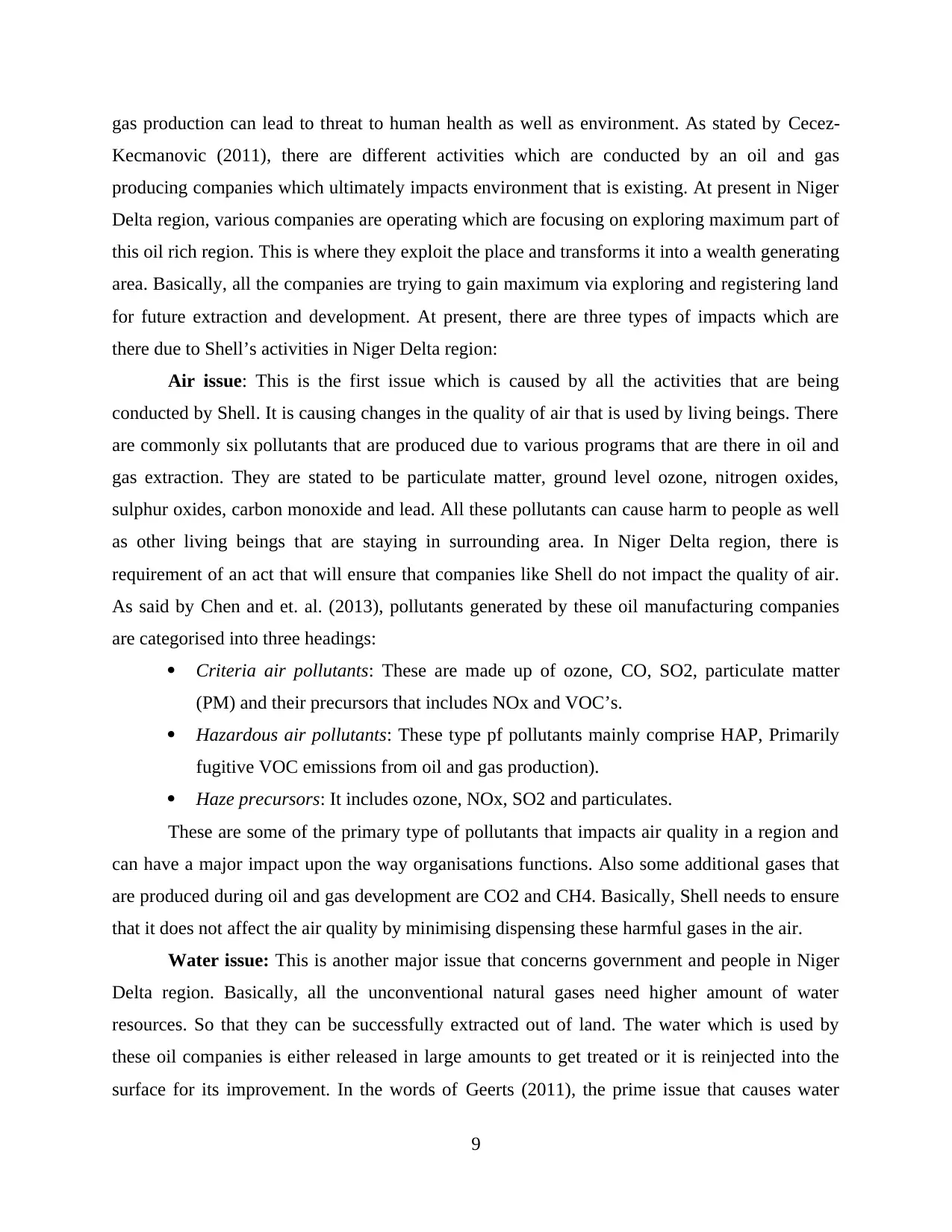
gas production can lead to threat to human health as well as environment. As stated by Cecez-
Kecmanovic (2011), there are different activities which are conducted by an oil and gas
producing companies which ultimately impacts environment that is existing. At present in Niger
Delta region, various companies are operating which are focusing on exploring maximum part of
this oil rich region. This is where they exploit the place and transforms it into a wealth generating
area. Basically, all the companies are trying to gain maximum via exploring and registering land
for future extraction and development. At present, there are three types of impacts which are
there due to Shell’s activities in Niger Delta region:
Air issue: This is the first issue which is caused by all the activities that are being
conducted by Shell. It is causing changes in the quality of air that is used by living beings. There
are commonly six pollutants that are produced due to various programs that are there in oil and
gas extraction. They are stated to be particulate matter, ground level ozone, nitrogen oxides,
sulphur oxides, carbon monoxide and lead. All these pollutants can cause harm to people as well
as other living beings that are staying in surrounding area. In Niger Delta region, there is
requirement of an act that will ensure that companies like Shell do not impact the quality of air.
As said by Chen and et. al. (2013), pollutants generated by these oil manufacturing companies
are categorised into three headings:
Criteria air pollutants: These are made up of ozone, CO, SO2, particulate matter
(PM) and their precursors that includes NOx and VOC’s.
Hazardous air pollutants: These type pf pollutants mainly comprise HAP, Primarily
fugitive VOC emissions from oil and gas production).
Haze precursors: It includes ozone, NOx, SO2 and particulates.
These are some of the primary type of pollutants that impacts air quality in a region and
can have a major impact upon the way organisations functions. Also some additional gases that
are produced during oil and gas development are CO2 and CH4. Basically, Shell needs to ensure
that it does not affect the air quality by minimising dispensing these harmful gases in the air.
Water issue: This is another major issue that concerns government and people in Niger
Delta region. Basically, all the unconventional natural gases need higher amount of water
resources. So that they can be successfully extracted out of land. The water which is used by
these oil companies is either released in large amounts to get treated or it is reinjected into the
surface for its improvement. In the words of Geerts (2011), the prime issue that causes water
9
Kecmanovic (2011), there are different activities which are conducted by an oil and gas
producing companies which ultimately impacts environment that is existing. At present in Niger
Delta region, various companies are operating which are focusing on exploring maximum part of
this oil rich region. This is where they exploit the place and transforms it into a wealth generating
area. Basically, all the companies are trying to gain maximum via exploring and registering land
for future extraction and development. At present, there are three types of impacts which are
there due to Shell’s activities in Niger Delta region:
Air issue: This is the first issue which is caused by all the activities that are being
conducted by Shell. It is causing changes in the quality of air that is used by living beings. There
are commonly six pollutants that are produced due to various programs that are there in oil and
gas extraction. They are stated to be particulate matter, ground level ozone, nitrogen oxides,
sulphur oxides, carbon monoxide and lead. All these pollutants can cause harm to people as well
as other living beings that are staying in surrounding area. In Niger Delta region, there is
requirement of an act that will ensure that companies like Shell do not impact the quality of air.
As said by Chen and et. al. (2013), pollutants generated by these oil manufacturing companies
are categorised into three headings:
Criteria air pollutants: These are made up of ozone, CO, SO2, particulate matter
(PM) and their precursors that includes NOx and VOC’s.
Hazardous air pollutants: These type pf pollutants mainly comprise HAP, Primarily
fugitive VOC emissions from oil and gas production).
Haze precursors: It includes ozone, NOx, SO2 and particulates.
These are some of the primary type of pollutants that impacts air quality in a region and
can have a major impact upon the way organisations functions. Also some additional gases that
are produced during oil and gas development are CO2 and CH4. Basically, Shell needs to ensure
that it does not affect the air quality by minimising dispensing these harmful gases in the air.
Water issue: This is another major issue that concerns government and people in Niger
Delta region. Basically, all the unconventional natural gases need higher amount of water
resources. So that they can be successfully extracted out of land. The water which is used by
these oil companies is either released in large amounts to get treated or it is reinjected into the
surface for its improvement. In the words of Geerts (2011), the prime issue that causes water
9
⊘ This is a preview!⊘
Do you want full access?
Subscribe today to unlock all pages.

Trusted by 1+ million students worldwide
1 out of 42
Related Documents
Your All-in-One AI-Powered Toolkit for Academic Success.
+13062052269
info@desklib.com
Available 24*7 on WhatsApp / Email
![[object Object]](/_next/static/media/star-bottom.7253800d.svg)
Unlock your academic potential
Copyright © 2020–2026 A2Z Services. All Rights Reserved. Developed and managed by ZUCOL.





